Spring Offerings 2026
Please email pcollege@hartford.edu or call 860.768.4495 with any questions.
Dive into new topics or revisit your favorites. With no membership fees, you can register for only the courses and lectures that interest you.
Registering for Presidents’ College courses is easy. Follow the steps below to select a course (or several!) and complete your registration.
- Click the “+” next to a course title to view details.
- Within the course description, click "Register".
- Select "Add to Cart".
- To register for one course, click "Checkout" (bottom right).
- To register for multiple courses, add additional courses either from the course listing page or directly from the registration screen before clicking “Checkout.”.
Please note that course tuition and fees are non-refundable unless the Presidents' College cancels or changes a class
Arts

Fresh Takes on Coming-of-Age Films*
Instructor: MICHAEL WALSH
Mondays, January 12, 19, 26, February 2, 3–4:30 p.m.
Wilde Auditorium/Harry Jack Gray Center
$80
Coming-of-age films chronicle adolescence—a fraught, turbulent journey—showing how teenagers and parents sail or stumble down that road. These films gained traction in the1950s-60s, as baby-boom teenagers exerted cultural and economic force. But the genre had a 19th-century literary predecessor: the Bildungsroman, novels whose youthful protagonists experienced psychological growth and moral uplift. Traditionally, young white males anchored these stories, but recent decades have brought dramatic change: our film selection follows both LBGTQ characters and people of color. Also, coming of age isn't only about the teens: mid-life shocks shake the parents, too. (The parents in Lady Bird open the newspaper and are stunned to read of the death of someone they knew in high school.) Yet often enough there's humor in teenage angst; three of our four films are comedies. Let's count on our laughs to pierce winter's gloom.
Please note: We always watch the films prior to class meetings, all the better to discuss them!
- The Graduate (Mike Nichols, US, 1967). In his breakout role in this defining film of the “New Hollywood,” Dustin Hoffman stars as Benjamin Braddock, an alienated college graduate. He's seduced by an older, married woman (played by Anne Bancroft), and then becomes romantically involved with her daughter (Katharine Ross as Elaine). Written by Buck Henry (with input from Oedipus), the film is buoyed by Simon and Garfunkel's hit song “Mrs. Robinson.” Both film and song scored a huge commercial success, garnering Mike Nichols the Oscar for Best Director.
- Life Is Sweet (Mike Leigh, UK, 1990). Set in suburban London as the Thatcher years end, this ensemble comedy pokes fun at eating, drinking and comically dreadful restaurants. The dad, Andy, is a catering chef with delusions of running his own food truck. Nicola, one of his twin daughters, is a bulimic whose hidden sexuality also involves food (chocolate). It's all a product of Director Mike Leigh's unusual improv techniques: he sketches his characters, then improvises for weeks until he has a polished shooting script. Starring Jim Broadbentt and Alison Steadmann.
- Moonlight (Barry Jenkins, US, 2016). This luminous film gives us three chapters in the life of an African American boy in Miami who grows up gay in a world of crackhead parents and crack dealers who assume parental roles. We encounter the boy in grade school, high school and young adulthood. Moonlight swept the Oscars for Best Picture, Best Adapted Screenplay, and Best Supporting Actor Mahershalaa Ali). It was the first film with an all-Black cast and the first gay-themed film to win Best Picture.
- Lady Bird (Greta Gerwigg, US, 2017). Gerwig’s directorial debut is a semi-autobiographical story that follows a Sacramento girl from the start of her high school senior year to the start of college a year later. The brilliant Saoirse Ronan plays the girl, who has named herself Lady Bird. She fights doggedly with her mother, a psychiatric nurse who, ironically, is kind and sympathetic to everyone except her own daughter. Meanwhile, Lady Bird's middle-aged father has been laid off, showing us how coming-of-age films often overlay a midlife crisis on an adolescent one.
Instructor: MICHAEL WALSH previously chaired Cinema Departments at Binghamton and University of Hartford, where he co-founded the Cinema major and has taught film studies for 25 years. He has published widely on film, literature, and theory. His recent articles are about the French New Wave director Chris Marker and the issue of adult/adolescent sexuality in Nabokov’s Lolita and Marguerite Duras’ The Lover. His book Durational Cinema: A Short History of Long Films came out in 2022 with Palgrave Macmillan.
*Made possible in part by the generosity of the Richard P. Garmany Fund at the Greater Hartford Gives Foundation, formerly the Hartford Foundation for Public Giving.
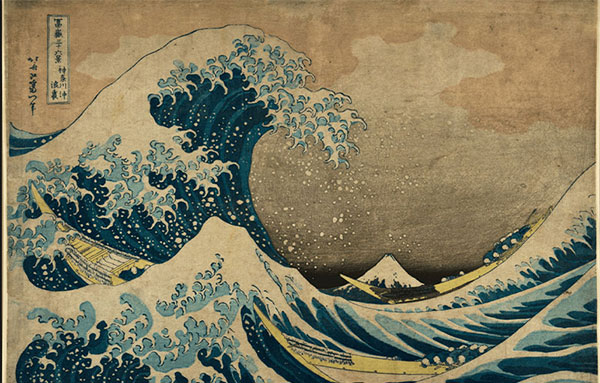
The 19th Century Vogue for Japanese Culture at Hill-Stead & Beyond*
Instructor: ANNA SWINBOURNE
Lecture: Thursday, February 19, 11 a.m.–12:30 p.m., McLean (off-campus/Simsbury)
Hill-Stead Experience: Lecture + Exhibit + Lunch: Tuesday, April 28, 11 a.m.–1 p.m.
$20 for lecture only; $55 for Hill-Stead Experience
Japonisme hit the Western world like a tsunami soon after 1853, the year Commodore Matthew Perry landed on those unfamiliar shores. Japanese objects, dress, and culture sparked widespread fascination in the decades following. It touched every Western artistic discipline: think Madame Butterfly and The Mikado, and a revival of Ukiyo-e (block-printing) techniques in Europe. Claude Monet, Edgar Degas, James Whistler and Mary Cassatt all came under its spell. Hill-Stead's founders, the Popes, bought 19th Japonisme treasures, but their enthusiasm for the country moved them to add much older objects, too. A rare Buddhist handscroll from 744 CE is a recent, once-in-a-lifetime discovery in Hill-Stead’s holdings. Anna Swinbourne will share the incredible story of how the Pope family encountered this amazing object; she will also persuade you of Japonisme’s allure via textiles, lacquerware, netsuke, and prints and paintings by Old Master and Impressionist artists. Catch this remarkable, and remarkably beautiful, wave.
Please note: Our Hill-Stead Experience, open only to our registrants, invites you to attend Anna Swinbourne’s lecture at the beautiful Pope family estate in Farmington. After sharing her tales of the Pope family’s growing fascination with Japanese culture, Dr. Swinbourne will open the doors of the gallery and the house itself so that you can take in their rare Japonisme treasures in situ. May you be dazzled enough to want to share your impressions with friends over lunch, which will await you upon the close of your self-guided tour.
The Great Wave: Japonisme at Hill-Stead is on view at Hill-Stead in the gallery and period rooms of the historic house from December 12, 2025 to April 30, 2026.
*Made possible in part by the generosity of the Richard P. Garmany Fund at the Greater Hartford Gives Foundation, formerly the Hartford Foundation for Public Giving.
Instructor: ANNA SWINBOURNE (PhD) is executive director and CEO of Hill-Stead Museum in Farmington, CT, and an independent art historian, curator, and art advisor engaged in publication, exhibition and art-market endeavors. From 1999 to 2009, Dr. Swinbourne was on the curatorial staff of The Museum of Modern Art, New York, where she created a catalogue on the unparalleled Niarchos Collection, and curated—either independently, or with Chief Curators, Kirk Varnedoe and John Elderfield—major exhibitions on Vincent Van Gogh, Pablo Picasso, Édouard Manet, and James Ensor, the last two of which were awarded First Prize for Best Historical Show of the year by the International Art Critics Association (AICA). Prior to joining MoMA, Anna was an Assistant Vice President in the Impressionist and Modern Art Department of Sotheby’s, New York. Trained at the École du Louvre in Paris, Tufts University (BA), and the Institute of Fine Arts of New York University (MA.; PhD.), she is a Trustee of Hill-Stead Museum as well as member of the Board of Managers of Lewis Walpole Library of Yale University and the Art Advisory Committee of King Baudouin Foundation United States.
Harmonies of Our Homelands From Colonial Times*
Instructors: DEE HANSEN, ERIC HANSEN, NEAL HUMPHREYS
Friday, February 20, 2–3:30 p.m., The McAuley (off-campus/West Hartford)
$20
Early arrivals to the New World landed with the musical sounds of their homelands—ballads, dance tunes, and sonatas—as part of their identities. Slaves arriving in chains also brought their music; they sang to find solace and to pass information. The trio Entwyned will share images and historical context to set the stage for their performance of music from the era prior to the American Revolution from Europe —England, Scotland, Ireland, Spain, Germany, and France—alongside the musical cultures of those who arrived against their will as slaves. The imported tunes, traditions, and instruments of these early arrivals to the colonies evolved into American sounds that we know and love today.
*Made possible in part by the generosity of the Richard P. Garmany Fund at the Greater Hartford Gives Foundation, formerly the Hartford Foundation for Public Giving.
Instructors: DEE (DEMARIS) HANSEN (MA, Music History; Phd, Musical Arts) is a professor emerita of music education and author of 100 Years of Hartt: A Centennial Celebration (Wesleyan University Press, 2020). She served as director of Hartt Graduate Studies, chair of Graduate Studies in Music Education, and was director of The Hartt Summerterm graduate program (2006-2014). Dr. Hansen specializes in curriculum and assessment development, music and literacy connections, brain research, and learning theory. She is the primary author of The Music and Literacy Connection (2025, 3rd ed.). She performs with the Entwyned Early Music trio as a Renaissance and Baroque flautist, Celtic harpist, and Baroque guitarist.
ERIC HANSEN retired in 2019 from the Connecticut State Library as Electronic Resources Coordinator. He holds a master’s degree in music history and completed postgraduate work in musicology at the University of Chicago with the late Howard Mayer Brown. He performed as a professional bassist and lutenist in concerts and on recordings with nationally known musicians including Mannheim Steamroller. Over the years Eric has played the lute on two gold albums and two multi-platinum albums.
NEAL HUMPHREYS is the manager of Student Academic Services for The Hartt School. He graduated from The Hartt School with bachelor's and master's degrees in Cello Performance with an emphasis in chamber music. He delights audiences all over with an expansive and eclectic array of musical styles and influences.

Bringing Grimms’ Fairy Tales to Life*
Instructor: TOM LEE
Mondays, Feb. 23, March 2, 9, 12:45-2:15 p.m., Hillyer Hall 125
$60
Once upon a time (1812, to be exact) German brothers Jacob and Wilhelm Grimm published a collection of 86 children’s tales. Time passed and the public noticed. Some stories weren’t considered children’s fare; they rocked the storytellers who rocked the cradles. Some called “Grimm” a fitting moniker. But the tales are popular to this day, and their witches and innocent children now live in all cultures, recognized worldwide. Professional storyteller Tom Lee selects some tales and wills them into life by telling and showing. His kind of “acting out” invigorates a tale: it’s no longer a bug fixed in amber – and is way more unpredictable and exciting as he pulls from multiple adaptations of the tales at hand! Tom Lee performs for the first half of each session, dramatizing the power and, yes, the modernity of Grimms’ tales, as an entrée into teaching you about the Grimm brothers’ history and influence.
*Made possible in part by the generosity of the Richard P. Garmany Fund at the Greater Hartford Gives Foundation, formerly the Hartford Foundation for Public Giving.
Instructor: TOM LEE has told stories internationally for thirty-five years. He has performed at The Metropolitan Museum of Art, The Yale Center for British Art, The Morgan Library, The Metropolitan Opera Guild, and as artist-in-residence at the International Storytelling Center. Tom currently teaches “Creativity: The Artistic Process” at the University of Hartford.
The Powerful Lineage of African American Art*
Instructor: CHRISTINA SWAIDAN
Thursdays, February 26, March 5, 2–3:30 p.m., Woods Classroom/Harrison Libraries
$40
Deepen your understanding of the powerful lineage of African American art —art that has challenged systems, told untold stories, and ignited cultural movements. Together, we will uncover how African American art has shaped and been shaped by the historical and social forces of its time. Professor Swaidan guides us through three eras of artistic expression born of the African Diaspora: folk art and the visual legacies of slavery; the rise of post-Emancipation artistic expression, as black artists strove to counter stereotypes of blackness and to define their power over themselves and their art; the cultural-artistic revolution of the Harlem Renaissance, as they wrestled with the double consciousness written into their experience. There is much to appreciate in this important legacy. Professor Swaidan will give us interpretive tools: the themes, styles, and ideological dimensions of African American art. We’ll encounter artists we don’t know, and some we do, as we consider how these artists have used their craft to resist, remember, celebrate, and imagine new worlds. We hope you walk away inspired.
*Made possible in part by the generosity of the Richard P. Garmany Fund at the Greater Hartford Gives Foundation, formerly the Hartford Foundation for Public Giving.
Instructor: CHRISTINA SWAIDAN (BA, Mount Holyoke; MEd, Saint Joseph University; EdD, University of Hartford) is visiting associate professor of educational leadership, department chair and program director of the EdD program in the College of Education, Nursing and Health Professions at the University of Hartford. Her research explores the psychic duality or double consciousness experienced by African Americans in higher education, and she was recently recognized at the 2025 100 Women of Color Gala and Awards for her work.

The Conductor’s Vision from Score to Stage*
Instructor: KALENA BOVELL
Lecture: Tuesday, March 10, 3–4:30 p.m., Wilde Auditorium/Harry Jack Gray Center
Hartford Symphony Orchestra Masterworks Performance: The Pines of Rome
Sunday, March 15, 3 p.m., The Bushnell’s Belding Theater
$20 for Lecture Only/$50 for Lecture + HSO Concert
"We are the music makers/And we are the dreamers of dreams" —Arthur O’Shaughnessy
Hartt School alum Kalena Bovell rose from self-taught musical beginnings in Los Angeles to conducting at the BBC Proms in 2021. She made history in 2023 as the first Black woman to conduct opera in Canada. Maestra Bovell returns here this Spring to guest conduct the Hartford Symphony Orchestra and to tell us her remarkable personal story. What is her preparation, her work process, for the HSO program, for example? How does she study scores to learn and interpret them? (Hint: colored pencils!) Does she listen to other conductors’ versions? Maestra Bovell will demonstrate conducting techniques and enlighten us as to just how she transmutes notes on the page into music we hear. Bring open ears and your questions.
*Made possible in part by the generosity of the Richard P. Garmany Fund at the Greater Hartford Gives Foundation, formerly the Hartford Foundation for Public Giving.
Instructor: KALENA BOVELL came to music at 11, began private violin study at 18 and now shares her career story to inspire musicians from nontraditional backgrounds. Her distinctive voice as maestra, speaker, and poet has won her praise as “one of the brightest stars in classical music” (Channel 3 News, Connecticut). She is the 2024 recipient of the Sphinx Medal of Excellence and a former Taki Alsop Conducting Fellow. The 2025–2026 season brings debuts with the New World Symphony, Redlands Symphony, and Acadiana Symphony, as well as a homecoming to the Hartford Symphony. Bovell also rejoins the Chineke! Orchestra for their tenth anniversary season, her first collaboration with them since their BBC Proms performance in 2021.
Please note: If you’ve already signed up for our lecture + HSO Concert option for Sunday, you may transfer your ticket to Friday or Saturday evening by simply writing to Charles Feierabend at cfeierabend@hartfordsymphony.org.
How Music Reflects and Provokes Historical Change*
Instructor: KAREN COOK
Wednesdays, April 1, 8, 15, 10:30 a.m.–noon, KF Room/Harrison Libraries
$60
“And the times, they are a-changin’.” Yes. Bob Dylan’s lyrics nail our theme: society’s upheavals produce musical upheavals. Our course starts five hundred years pre-Dylan, when John Cooke composed in a plague-ridden, war-riven 14th century. He wrote music imploring spiritual help for earthly woes. Others wrote tunes blaming the (supposed) disease-causing culprits. Some music was laudatory, like the Agincourt Carol celebrating King Henry V’s victory in Normandy. Philippus de Caserta penned ballads lauding the anti-Pope in Avignon. Fast forward to another era that reshaped musical composition and participation: the Protestant Reformation’s tortuous divorce from the Catholic Church. William Byrd, a Catholic Englishman, wrote music with secret messages intended to keep the faith; Jean Calvin destroyed music not fit for “proper” worship. Then we’ll accelerate into the 20th century, two World Wars, and music used for solidarity and resistance, celebrating musical giants Paul Robeson and Fannie Lou Hamer. Popular instructor Karen Cook is our Pied Piper; she’ll supply melodious examples to prove her points and train your ears.
*Made possible in part by the generosity of the Richard P. Garmany Fund at the Greater Hartford Gives Foundation, formerly the Hartford Foundation for Public Giving.
Instructor: KAREN M. COOK is associate professor and chair of music history at The Hartt School. She specializes in music of the fourteenth and fifteenth centuries and also in medievalism in contemporary music & media, especially video games. Her book Music Theory in Late Medieval Avignon: Magister Johannes Pipardi was published in 2021 as part of Routledge’s RMA Monographs Series. She is currently co-editing two volumes: Gender, Sexuality, and Video Game Sound, with Michael Austin and Dana Plank for Routledge, and Global Histories of Video Game Music Technology, with William Gibbons and Fanny Rebillard for Brepols. She teaches and lectures on popular music topics at Hartt, conferences and symposia.

History Recast: Documentary Theater, Community, and the Hartford Circus Fire*
Instructors: MICHELE TROY, JACQUES LAMARRE and JARED MEZZOCCHI
Lectures: Mondays, April 27, May 4, 2–3:30 p.m., KF Room/Harrison Libraries
Production: Sunday, May 3, 1:30 p.m. discussion with director & playwright, 2:30 p.m. Theaterworks show
$40 for lectures only/$65 for lectures + ticket
Learn about the powerful tradition of documentary theater—also known as verbatim theater—which transforms real-world dialogue and events into compelling stage scripts. Examine how this genre uses actual interviews and historical records to tackle complex social issues and tragedies, offering multiple perspectives rather than taking a single side. We’ll first consider how groundbreaking works such as Anna Deavere Smith’s Fires in the Mirror (1992) and Moisés Kaufman’s The Laramie Project (2000), paved the way, both utilizing extensive interviews to explore community tensions, violence, and healing. Then we’ll zero in on Theaterworks’ multi-media production about the devastating Hartford circus fire of 1944, in which “two communities – Hartford and the Circus – find themselves irretrievably intertwined by tragedy, blame, heroism and healing.” Join Presidents’ College Director Michele Troy for a stimulating discussion of what happens when theater takes up the subject of history—and, indeed, this time, history so close to home.
*Made possible in part by the generosity of the Richard P. Garmany Fund at the Greater Hartford Gives Foundation, formerly the Hartford Foundation for Public Giving.
Instructors: MICHELE K. TROY is Presidents’ College director and professor of English at Hillyer College, where she has taught since 2001. Her book, Strange Bird: The Albatross Press and the Third Reich, appeared with Yale University Press in 2017, followed by a German translation in 2022. In 2019, she received a Fulbright to Germany to pursue two other projects which explore Anglo-American books abroad: an in-depth look at the German book trade under the American Occupation, 1945-1949, with the University of Mainz; and research into Seven Seas Books, which produced English-language paperbacks out of East Berlin in the 1950s and 1960s. She is currently researching how particular European publishing networks were used to advance political ends in 1930s Europe and into the war.
JACQUES LAMARRE is a Hartford-area playwright and arts marketing professional. TheaterWorks Hartford has staged the world premieres of his plays I Loved, I Lost, I Made Spaghetti, Raging Skillet, Secondo, and, coming in April/May 2026, Circus Fire. Regional theatre credits include Playhouse on Park, Seven Angels, George Street, Asolo Rep, Florida Rep, Cincinnati Playhouse, Greater Boston Stage, Philly Fringe, Emerson Theatre Collaborative, Zeitgeist Stage, and more. Jacques writes for drag superstar Varla Jean Merman (their latest, The Drowsy Chappell Roan, comes to TheaterWorks in March 2026). He has co-written three drag shows currently running in Puerto Vallarta: Miss Conception’s Make America Gay Again, Sutton Lee Seymour’s Super Ma’am, and DIVA’s High Notes, Low Standards. Jacques is the Chief Creative Officer for BuzzEngine and serves on the boards of the Hartt School and CT Humanities. He is the recipient of the Tom Killen Award for Lifetime Achievement in Connecticut Theatre from the CT Critics Circle, the Kid at Heart Award from Hartford Children’s Theatre, the Bring It Home Award for Connecticut Tourism, and an award from HartBeat Ensemble for his commitment to building diverse audiences.
JARED MEZZOCCHI is a two-time Obie Award-winning theater artist, working as a director, multimedia designer, playwright, and actor. Based out of New York, Mezzocchi’s work has appeared at notable theaters, including Geffen Playhouse, Vineyard Theater, The Kennedy Center, Playwrights horizons, Theaterworks Hartford, Arena Stage, Woolly Mammoth (company member), and many more. In 2020, The New York Times spotlighted his multimedia innovations alongside the pandemic work of four others, including Andrew Lloyd Webber and Paula Vogel. Mezzocchi is a two-time MacDowell Artist Fellow, a 2012 Prince Grace Award–winner, and recently retired from The University of Maryland where he taught projection and multimedia in the MFA Design Program. During the pandemic, Mezzocchi founded Virtual Design Collective (VIDCO), which aided the development of over 50 new digital works over 18 months. This year, he will finish his book, A Multimedia Designer’s Method to Theatrical Storytelling with Routledge.
*Made possible in part by the generosity of the Richard P. Garmany Fund at the Greater Hartford Gives Foundation, formerly the Hartford Foundation for Public Giving.
Presidents' College Conversations
Join us for insightful discussions on contemporary issues of interest. Pay per session. Or, become a Presidents’ College Fellow. Fellows attend all four Presidents’ College Conversations per year at no charge, plus enjoy special library and parking privileges.

Does American Health Care Need Repair?
Instructors: JILLIAN GILCHREST and BEN WADE
Thursday, February 12, 11 a.m.–12:15 p.m., Wilde Auditorium/Harry Jack Gray Center
Free for Fellows and Non-Fellows alike, but we ask that you please register to attend.
Why is U.S. health care so complicated? Would European-style universal health care be more desirable? Or is our approach better than we think? What is being done here in Connecticut to make access to quality health care more equitable? And to what degree are federal changes affecting our health care system here at home? Jillian Gilchrest, the Connecticut Representative who Co-Chairs the Human Services Committee in Hartford, provides perspective in a discussion moderated by Ben Wade, Senior Vice President of Strategy & Marketing at Stamford Health, also responsible for government affairs and community relations. This discussion will be the first of a series of Presidents’ College conversations in which we call upon different experts to provide insight on the important topic of health care—which has the power to sway everything from elections to the quality of our lives. Both experts draw on their experience navigating the wilds of the health care bureaucracy at state and federal levels to explore two driving questions: to what degree does our system need repair? and how capable are we of achieving it?
Instructors: JILLIAN GILCHREST was elected to represent the 18th District of West Hartford in the Connecticut General Assembly (CGA) in 2018. She serves as House Chair of the Human Services Committee and member of the Appropriations, Public Health, and Judiciary Committees. Jillian also chairs MAPOC, the Trafficking in Persons Council, and the Endometriosis Working Group. Prior to becoming a state representative, Jillian served as the Director of Health Professional Outreach for the Connecticut Coalition Against Domestic Violence, Executive Director of NARAL Pro-Choice Connecticut, and Director of Policy & Communications for the Connecticut Alliance to End Sexual Violence. She has extensive experience advocating for women’s health and safety, in particular influencing public policy at the CGA. Jillian was elected to the West Hartford Board of Education in 2013. She holds an MA in Social Work with a focus in Policy Practice from the University of Connecticut School of Social Work, where she has taught Political Advocacy, and currently teaches for the University of Saint Joseph and University of Hartford.
BEN WADE is Senior Vice President of Strategy & Marketing at Stamford Health, where he is responsible for executive leadership in government affairs and community relations, alongside strategy, marketing and communications. Before joining Stamford Health, Wade served as Assistant Vice President of Strategic Planning for Montefiore Medical Center, a progressive integrated academic health system serving the Bronx and New York’s Hudson Valley. At Montefiore, Wade was responsible for leading regional planning with senior clinical and administrative executives, including service line development, ambulatory access expansion, and innovation strategies, as well as provider engagement, network development and strategic partnerships. Wade has also worked as a consultant with the Boston Consulting Group in New York and at The Advisory Board Company in Washington, D.C. He holds a Masters in Business Administration from Columbia University and received his undergraduate degree from Dartmouth College.
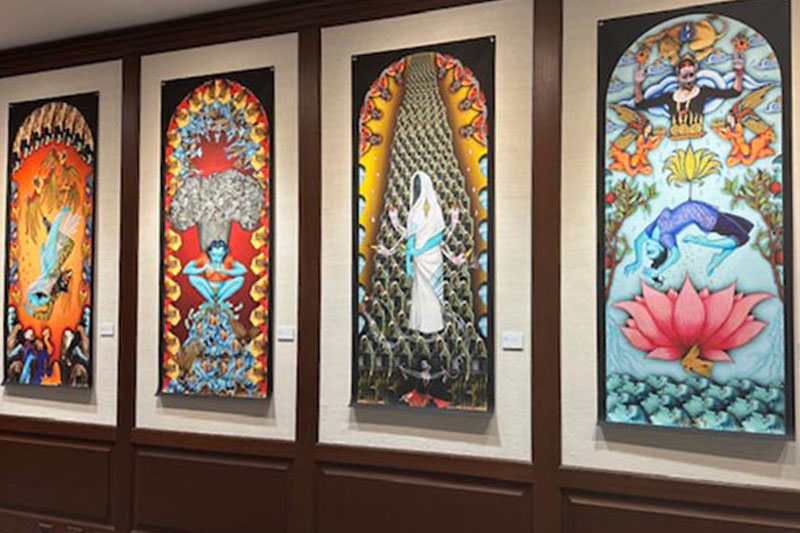
Thinking Past “Us” vs. “Them”: A Conversation About Identity*
SIONA BENJAMIN and AMY WEISS
Tuesday, April 14, 11 a.m.–12:15 p.m., Greenberg Center/Harry Jack Gray Center
Free for Fellows/$20 for Non-Fellows
Art, like travel to foreign climes, challenges our notions of who we are and where we belong. We find ourselves destabilized when the syllables of an unknown language flow over us on a foreign city bus: still ourselves, but jostled into a new experience. It can be uncomfortable—what we thought was “normal” has been turned on its head, Alice-in-Wonderland style—yet also highly stimulating. Artist Siona Benjamin seeks out this “in between” in her life and art, which engages with her Jewish upbringing in a mainly Hindu and Muslim India. And she wants to talk about it. “Thinking in boxes doesn’t take you too far,” Benjamin mused at the opening of her University of Hartford exhibit in November. “I pitch my tent wherever I go. I find it liberating. I can identify with so many people.”
Join Benjamin and Greenberg Center Director, Amy Weiss, for a thought-provoking conversation about identity. How do we think past the “boxes,” the fixed notions of “us” and “them” that have reinforced so many entrenched political, racial, and religious divides—recently leading to everything from the longest U.S. government shutdown ever, to violations of the writ of habeus corpus for immigrants on U.S. soil, to devastating wars abroad? To what degree can thinking “outside the box” of identity help us push back at partisanship and polarization? And where does it remain critically important to stand our ground? How can we know where to draw the lines of belonging and where to let them go?
An Infinite Journey: The Art of Siona Benjamin will remain on view at the Museum of Jewish Civilization at the University of Hartford until 30 April 2026.
*Made possible in part by the generosity of the Richard P. Garmany Fund at the Greater Hartford Gives Foundation, formerly the Hartford Foundation for Public Giving.
Instructor: SIONA BENJAMIN (MFA painting, SIU-Carbondale, IL; MFA theater set design, University of IL-Urbana/Campaign) is a Bene Israel Jew from India, now living in the United States, whose transcultural and multicultural art has been exhibited in the United States, Europe and Asia. She was awarded two Fulbright Fellowships, one to India in 2011 to India, and a second in 2016–17 to Israel. As not just a Jewish artist, but also as one who crosses cultural boundaries, she’s received praise in The New York Times, The Chicago Tribune, The Philadelphia Inquirer, The Financial Times, The Boston Globe, Art in America, Art New England, Art and Antiques, ArtNews, Moment magazine, The Times of India, The Mumbai Mirror, Marg Magazine, and other publications. Her multicultural art has also been featured in The Jewish Week in New York City and New Jersey, The Jerusalem Post, The Times of Israel, among others.
AMY WEISS is an Assistant Professor of Judaic Studies and History at the University of Hartford, where she also holds the Maurice Greenberg Chair for Judaic Studies. Most recently, she received a 2025–2026 Memorial Foundation for Jewish Culture Fellowship and a 2024 National Endowment for the Humanities Summer Stipend to assist with the completion of her first book Interfaith Friends and Ideological Foes: American Jews, Evangelicals, and Israel, 1963–2018 will be published by Oxford University Press in 2026. She is 2025–2026 lead faculty fellow for the University of Hartford Humanities Center, where she is teaching a two-semester course on "AI in Action: The Future of Humans."
Bonus Fellows Event
We’ll share more information in the new year as details are finalized.
*Made possible in part by the generosity of the Richard P. Garmany Fund at the Greater Hartford Gives Foundation, formerly the Hartford Foundation for Public Giving.
*Made possible in part by the generosity of the Richard P. Garmany Fund at the Greater Hartford Gives Foundation, formerly the Hartford Foundation for Public Giving.
History and Current Events

Trade, Tariffs & Technology
Instructor: FARHAD RASSEKH
Thursdays, January 22, 29, February 5, 10:30 a.m.–noon, KF Room/Harrison Libraries
$60
It’s a good bet you’ve heard more about tariffs in the last 18 months than at any time since Smoot met Hawley (ca.1930.) But is what you’ve heard and read accurate? Are countries upon which the US imposes tariffs the ones who also pay them? What economic strategies drive their use, and what are their up- and downsides? If the globalization of trade brought them, what other changes have they wrought?
This course looks at the US economy now, especially at controversies about the trade deficit, tariffs, and loss of manufacturing jobs. To grasp the “now” we need grounding in the “before,” so Professor Rassekh gives us 18th-century trade theory alongside crucial 19th century contributions by David Ricardo and John Stuart Mill. He’ll segue to Paul Samuelson, the Nobel-prize-winning American economist who spelled out the intricacies of international trade relations in the 20th century. No previous economics courses are required, just a lively interest in current international trade issues and how economic concepts play out IRW (“in the real world”).
Instructor: FARHAD RASSEKH is a professor of economics at the University of Hartford’s Barney School of Business. He has taught international and managerial economics, macroeconomic analysis, history of economic thought, and principles of economics. The author of Four Central Theories of the Market Economy (Routledge, 2017) and articles in peer-reviewed journals, his research encompasses international trade, economic growth, and the history of economic thought. He is currently researching the role of institutions in cultivating and fostering innovative ideas.

How Big-Time College Sports Went Wrong & What To Do About It
Instructor: WALTER HARRISON
Tuesdays, March 10, 24, 31, 10:30 a.m.–noon
Wilde Auditorium
$60
The business of big-time college sports smashes records in every category: game attendance, viewership on all media, and dollars. TV networks forge billion-dollar (yes, with a “b”) broadcast deals with major college conferences, while their football coaches score annual salaries of $10 million. In October 2025, Penn State fired football coach James Franklin after the team lost three games straight. That dismissal earned Franklin a $49 million buyout. LSU followed. The buyout for its head coach, Brian Kelly? $52 million. Add other buyouts for “underperformers,” and the total rockets to $250 million, enough to fund 6,000 full scholarships for students playing other college sports. Contrast this with the $49 million sports budget for the NCAA’s entire Division III. Its colleges—including the University of Hartford—don’t offer athletic scholarships.
There’s more. The transfer portal hands many college athletes major money to change schools. The NIL (name, image, likeness) deals pay upwards of $1 million to some athletes, and $50K-$900K to many. A consequence? Colleges may drop sports which don’t bring in revenue, and would-be student athletes then can’t compete at the highest level.
How did we get here? What can be done? Walt Harrison will discuss the history of U.S. college sports, its successes and shortfalls. He’ll report on a range of sports, including women’s teams, and Olympics sports, probably the most threatened—and about how some top schools, despite their success, can’t compete in the new landscape. Without major media deals, even schools like UConn may be priced out of the talent pool.
Some big-time experts—those actively engaged with the NCAA and intercollegiate athletics—will Zoom in to join Walt for a lively discussion in the final session.
Instructor: WALTER HARRISON served as president of the University of Hartford from 1998–2017. From 2002–2012 he was a member of NCAA governance, chairing the executive committee (now called the board of governors), the committee on academic performance (now called the committee on academics), and President’s Council. In 2014 he received the NCAA President’s Gerald R. Ford Award, the NCAA’s highest honor, for his lifetime involvement in intercollegiate athletics and specifically for his leadership of the academic reform movement. From 2014–2022 he served on the Knight Commission on Intercollegiate Athletics, the foremost watchdog organization in college sports.

Liberty, Equality, Revolution: Rethinking Our Founding Principles at 250 Years
Instructor: CHRIS DOYLE
Wednesdays, March 11, 18, 25, 5:30–7 p.m., Wilde Auditorium/Harry Jack Gray Center
$60
All hail our nation’s big birthday, America’s 250th! But remember that George Washington dubbed us “The American Experiment.” Does this mean the Declaration of Independence was concocted by politically-mad scientists and loony optimists? Our current political and social crises remind us to reread our Declaration. Always-level Chris Doyle returns to juxtapose festive birthday celebrations against No Kings marches, ICE raids, government shutdowns, dramatic income inequality, and a Chief Executive pitching himself as a monarch. Session One covers the 1776 intellectual landscape when the Declaration was conceived, written, and endorsed by Americans. In Session Two, we assess liberty and equality—antagonistic ideals—and their uneasy coexistence over the past fifty years. Session Three focuses on revolution—as expressed via today’s political activism and the demands for gender, youth, racial, and class liberation. Timothy Snyder’s book, On Freedom (2024) is our text, along with some supplemental readings.
Instructor: CHRIS DOYLE has a doctorate in history. He has taught for 40 years, currently teaching at Avon Old Farms School. He publishes works on history, education, and the uses of the past in contemporary America. His teaching has been featured in stories in The New York Times and National Public Radio.
A Brief & Lively History of Hartford Radio
Instructor: JOHN RAMSEY
Friday, March 20, 2–3:30 p.m., The McAuley (off-campus/West Hartford)
$20
For tobacco farmers in rural Windsor and insurance executives in the city itself, Hartford’s radio stations were a lifeline to the world in the early days of broadcasting. It's easy to forget how critical this connection was in the days before TV or the internet. This session transports us back to that era, presenting a slice of area broadcast history that culls the photo and recording archives of local radio stations. It will appeal not only to radio buffs, but also to those for whom radio was the go-to destination for the new and now: from the just-released Beatles album to the tragedies and triumphs of local and world events. We’ll begin with the very first whispered signals coming from makeshift or modified equipment and head through the medium's heyday. The era offered full symphonies and studios lined with velvet curtains, local talent shows, swing bands, as well as the disc-jockeys that gave many of us in the Connecticut audience our first, thrilling taste of rock and roll.
Instructor: JOHN RAMSEY has been researching the history of Hartford radio stations for over two decades and is the author of the book Hartford Radio, part of Arcadia Publishing's Images of America Series, and is the webmaster of hartfordradiohistory.com. He serves as general manager of UHart's WWUH, is president of the Torrington Community Radio Foundation and is secretary of the CT chapter of the Society of Broadcast Engineers. For his longtime engagement with radio, he was inducted into the Connecticut Broadcasters Association Hall of Fame in 2015; on behalf of WWUH, he also accepted Connecticut Broadcaster Association awards in 2024 for Best Non-Commercial Station and in 2025 for Best College Radio Programming.
Philosophical Lessons on Resistance from 1930s Europe
Instructor: BENJAMIN BERGER
Mondays, March 30, April 6, 13, 2–3:30 p.m., KF Room/Harrison Libraries
$60
Philosophers, we know, wrestle with “the big questions” about the meaning of life and being. In times of high unrest, those questions can take a sharply political turn: What does “resistance” mean and—in any moment—what does it require? How do some people find strength and strategies to counter an ideology, a regime or political-social tumult? Is it better to try to neutralize, rather than escalate, violent conflict? These dilemmas confronted thoughtful people headlong in 1930s Europe, and a network of philosophers sought ways to resist in their own terribly present and particular historical moment. Walter Benjamin, Hannah Arendt, Simone Weil, and Jean Améry explored this topic by necessity, not by chance, when their era forced them to decide if justice demanded active resistance. How does the existential context shape a resister’s actions? Join us for a down-to-earth discussion about their philosophical disagreements. . . and perhaps our own. Are there any questions today more pertinent than these?
Instructor: BENJAMIN BERGER is visiting assistant professor and the director of the Philosophy Program in the College of Arts & Sciences at the University of Hartford. He writes about and teaches the history of philosophy and its contemporary relevance. Some of his publications include Schelling, Hegel, and the Philosophy of Nature: From Matter to Spirit (Routledge, 2024), The Schelling Reader (Bloomsbury, 2021), and The Schelling–Eschenmayer Controversy, 1801: Nature and Identity (Edinburgh University Press, 2020).

The Latest from Human Rights Watch Europe & Central Asia
Instructors: HUGH WILLIAMSON and JILDA ALIOTTA
Tuesday, April 21, 5:30–7 p.m.
Wilde Auditorium/Harry Jack Gray Center
$25
Hugh Williamson, the Director of Human Rights Watch for Europe and Central Asia, does not shy away from a challenge. He oversees the work of Human Rights Watch in western and eastern Europe, the Balkans, Turkey, Central Asia, the south Caucasus, Russia, Ukraine and Belarus, a mission that has only gotten more contentious with the Russian invasion of Ukraine four years ago. Join us as Jilda Aliotta—who regularly teaches human rights at the University of Hartford—opens up a discussion with Williamson about the current human rights landscape. Their conversation will be relevant and wide-ranging: from how Human Rights Watch identifies, tracks and monitors violations; to what is happening on the ground in Ukraine and other global areas of grave concern; to how much leeway human rights organizations have in pushing for change or prosecutions. How does the agency define what is an inalienable human right vs. desirable public policy? What is HRW’s strategy for fighting for human rights in the US at present? How can such an agency make a difference in such a difficult geopolitical landscape? And finally, for all of us who care about human dignity, come hear what ordinary people like us can do to further the cause of human rights.
Instructors: HUGH WILLIAMSON is director of Human Rights Watch for the Europe and Central Asia Division, overseeing HRW’s work in western and eastern Europe, the Balkans, Turkey, Central Asia, the south Caucasus, Russia, Ukraine and Belarus. He oversees issues including migration and discrimination in Europe, torture and other abuses under authoritarian rule in Central Asia, and impunity and the rule of law in Russia. Prior to joining HRW in 2011, Williamson worked for 11 years as a correspondent from the Manila and Berlin bureaus of the Financial Times. He served as the Europe news editor during the 2008-2009 financial crisis and most recently as the paper’s deputy foreign editor. He has written and commented in the international media, including on the BBC and CNN, on European politics, development issues and the international political economy, business ethics and corporate responsibility, and the politics of the human rights movement. Williamson has worked for other non-governmental organizations, including a labor rights group in Hong Kong. He has degrees from Manchester and the London School of Economics and speaks German.
JILDA ALIOTTA is a popular professor in the University of Hartford’s politics, economics, and international studies department, and is well known among Presidents’ College participants for her thought-provoking commentaries on the US Supreme Court in what has become one of our longest-running courses. She teaches classes in human rights, law, American politics, and women in politics.
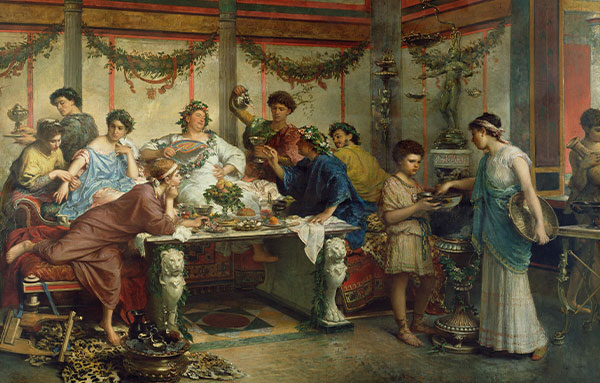
Food and Culture of Ancient Rome
Instructor: MARI FIRKATIAN
Tuesdays, January 27, February 3, 10, 2–3:30 p.m., KF Room/Harrison Libraries
$70 (includes $10 per person materials fee)
Two thousand years ago diets were mostly “locavore.” As Rome’s empire expanded, so did a robust import/export trading economy. Food and drink production, preparation and consumption became more varied and cosmopolitan. How did contemporary images and travel spread food news then? How do ancient Mediterranean tastes survive today, in that region and globally? Mari Firkatian seasons her sessions with the history of spices and ancient food’s religious and social implications. Taste her bread recipe from the time of Caesar and prepare a Roman appetizer to round out your culinary experience.
Please note: An ideal finale to this course or as a memorable stand-alone dining experience, we encourage you to consider also joining us for A Roman Feast at Metro Bis, an evening created exclusively for UHart. Enjoy a four-course meal with Roman spiced wine, historical insights from Mari Firkatian, and dishes inspired by ancient traditions.
Instructor: MARI A. FIRKATIAN is a professor of history and chair of the Hillyer Humanities Department at the University of Hartford. She has been a Fulbright Scholar and a National Endowment for the Humanities Fellow as well as a Yale University Fellow and a recipient of International Research and Exchanges Board scholarships. Her research interests began with nationalism, segued to diplomatic history, and her current research interests have veered toward food history. Her books are The Forest Traveler: Georgi Stoikov Rakovski and Bulgarian Nationalism, 1996, Diplomats and Dreamers: The Stancioff Family in Bulgarian History, 2008, and Home Again: Armenian Recipes from the Ottoman Empire, 2018. She has lived and traveled extensively in Southeast Europe, the Levant, and the Soviet Union.
A Roman Feast at Metro Bis
Instructor: MARI FIRKATIAN
Tuesday, February 24, 6:30–8:30 p.m., Metro Bis Restaurant (off-campus/Simsbury)
$80
Sample the tastes of ancient Rome in a custom designed four-course meal designed for the University of Hartford by the acclaimed Metro Bis Restaurant in Simsbury. You might be surprised at the inventive, yet healthy constellation of ingredients you find! We'll welcome you with a complimentary glass of Roman spiced wine to set the tone. Then, historian Mari Firkatian sets the historical backdrop: How is the food before us shaped by Rome's once expanding empire? Which trading routes carried the most exciting new spices or tastes back to Rome? How were these foods and culinary traditions imbued with religious or social meanings? Mingle with us over a delectable meal, in which you will come to understand how the food before you revives the traditions of a bygone era. Either a fitting capstone to our 3-session course, Food and Culture of Ancient Rome, or a wonderful one-time unique restaurant experience to encourage friends to gather mid-winter.
Instructor: MARI A. FIRKATIAN is a professor of history and chair of the Hillyer Humanities Department at the University of Hartford. She has been a Fulbright Scholar and a National Endowment for the Humanities Fellow as well as a Yale University Fellow and a recipient of International Research and Exchanges Board scholarships. Her research interests began with nationalism, segued to diplomatic history, and her current research interests have veered toward food history. Her books are The Forest Traveler: Georgi Stoikov Rakovski and Bulgarian Nationalism, 1996, Diplomats and Dreamers: The Stancioff Family in Bulgarian History, 2008, and Home Again: Armenian Recipes from the Ottoman Empire, 2018. She has lived and traveled extensively in Southeast Europe, the Levant, and the Soviet Union.
If the event is full when you try to register, please write us at pcollege@hartford.edu to be put on a wait list.
Ralph Ellison’s Invisible Man
Instructor: BRYAN SINCHE
Wednesdays, February 4, 11, 18, 10:30 a.m.–noon, KF Room/Harrison Libraries
$60
Ralph Ellison’s 1952 novel Invisible Man won the National Book Award and stunned mid-century readers. This class will consider why it still stuns. Ellison’s lived experience of racism and racial conflicts in 1920s and ‘30s America shapes the story told by an unnamed narrator. Yet it is not a “protest” novel. The narrator says, “I am not complaining, nor am I protesting either.” What is Ellison’s stance? The New York Times reported that Barack Obama modeled his 1995 memoir, Dreams from My Father, on Ellison’s book. Modern Library ranked it 19th among the 20th century’s top 100 novels, a veritable classic. Invisible Man is a long book, but Bryan Sinche—who taught us about Frederick Douglass last year—will guide our reading. And what else are wintry days and evenings for? Join us for three sessions on this remarkable book.
Instructor: BRYAN SINCHE (BA, University of Michigan; MA, PhD, University of North Carolina) is professor and chair of English and Modern Languages at the University of Hartford, where he has taught American and African American literature since 2006. Sinche is a scholar of 19th century African American literature and the author of Published by the Author: Self-Publication and Nineteenth-Century African American Literature (University of North Carolina Press, 2024). He has written more than twenty essays and reviews for journals including American Literary History, African American Review, ESQ, Legacy, and Biography and for collections published by Basic Books, Cambridge University Press, and the University of Wisconsin Press. He has edited two books: The Guide for Teachers, a companion to the third edition of the Norton Anthology of African American Literature (2014), and the first scholarly edition of Appointed: An American Novel (2019), co-edited with Eric Gardner.
Hamlet: Ghosts, Broken Promises & Shakespeare’s England
Instructor: HUMPHREY TONKIN
Thursdays, March 26, April 2, 9, 16, 2–3:30 p.m., KF Room/Harrison Libraries
$80
A young prince comes back from college, summoned by his father’s death and his mother’s remarriage. Forward-looking and well educated, he re-enters a world where the past is always present, where nothing is clear and questions abound. He shares those questions with us; he struggles to find answers and a path forward. It is a world of ghosts and broken promises, a past that finally overwhelms the dream of a brighter future. But it is also a world of theater.
Hamlet comes after Shakespeare’s exploration of the English past in his so-called history plays. It is the first of his major tragedies, followed by Othello, King Lear, and Macbeth. Hamlet wrestles with England’s ancient past; Macbeth looks to the future success of the Stuarts and the union of England and Scotland.
Why does this sprawling play of ghosts and mothers and duels and suicide remain the most iconic and famous of all of Shakespeare’s works? We’ll discover and discuss the multiple (four) versions and the collision of the old and the new at the drama’s core.
Instructor: HUMPHREY TONKIN was president of the University of Hartford during the 1990s and founder of the Presidents’ College as the 90s came to a close. For almost twenty years earlier in his career, he was professor of English at the University of Pennsylvania. He has written books and articles on Elizabethan literature, linguistics, and translation. Recent publications include an edited volume on Language and Sustainability (2023), an edition of the poems of Clarence Bicknell (2023), and a translation of Shakespeare’s Coriolanus into Esperanto (2023).
Getting Around Town. . . In The Air
Instructor: PAUL SLABOCH
Fridays, January 16, 23, 1–2:30 p.m., KF Room/Harrison Libraries
$40
From air taxis to doorstep drone delivery, a quiet revolution in flight is underway, and it may reshape our communities in the coming decade. Explore the emerging world of Urban Air Mobility, which blends accessible engineering concepts with real-world examples. Learn how electric air taxis will operate, why drones are being used for medical deliveries and emergency response, and what it will take to safely integrate thousands of new aircraft into our skies. No technical background required—just curiosity and a sense of wonder about the future of flight.
Instructor: PAUL SLABOCH is a licensed engineer and associate professor and department chair at the University of Hartford whose teaching and research span aeroacoustics, experimental aerodynamics, and emerging aviation technologies. He leads student-centered projects in high-altitude ballooning, delta wing aerodynamics, and supersonic engine acoustics, and NASA- and CT Space Grant–supported research initiatives. Dr. Slaboch is the author or co-author of over 25 peer-reviewed journal and conference papers and frequently contributes his aerospace expertise to regional and national media outlets such as NBC, ABC, CBS, and Fox. Having previously worked for the USDOT Volpe Center and the FAA studying Aircraft Wake Vortices and vortex mitigation strategies for air traffic control, he remains a strong advocate for hands-on, experiential learning. His work connects cutting-edge aerospace research with real-world applications across industry, education, and the broader community.

AI's Hidden Environmental Cost
Instructor: LAURA PENCE
Thursday, March 12, 2–3:30 p.m., KF Room/Harrison Libraries
OR
Friday, April 17, 2–3:30 p.m., The McAuley (off-campus/West Hartford)
$20
As artificial intelligence reshapes our world, its environmental cost is undeniable. While Generative AI (like ChatGPT) can optimize energy grids and model climate systems, its use consumes staggering amounts of power, water and land. It also accelerates the production of electronic waste. Laura Pence, science super-explainer, brings needed urgency to these AI contradictions and to the necessity for sustainable AI development.
Instructor: LAURA PENCE (BS Lebanon Valley College, PhD Michigan State University, Postdoctoral NIH Fellow at MIT) is a professor of chemistry at the University of Hartford with expertise in environmental and inorganic chemistry, and chemical education. For her work on environmental/sustainability issues, Pence was named a Fellow of the American Chemical Society in 2011 and spent 2012-2013 as a Congressional Science Policy Fellow in the office of Sen. Michael Bennet (D-CO), where she especially focused on energy, water and forestry. She also holds a joint appointment as a research scientist in the National Security Directorate of the Pacific Northwest National Laboratory. Twice ranked among the top 25 professors nationally on RateMyProfessor.com in both 2014 and 2017, Pence won the University of Hartford’s Roy E. Larsen Award for Excellence in Teaching in 2006 and the Oscar and Shoshona Trachtenberg Award for outstanding service in 2023.

Promising Research for the Aging Brain
Instructor: PAOLA SACCHETTI
Tuesday, April 7, 2:30–4 p.m., KF Room/Harrison Libraries
OR
Monday, April 20, 2–3:30 p.m., McLean (off-campus/Simsbury)
$20
New drugs targeting Alzheimer’s Disease have hit the market recently, after decades of the status quo. How effective are they? Are claims that we’re at a turning point in the search for a cure overblown? Since more than 7 million Americans are afflicted (one in nine over 65), we need to talk. This discussion explores the aging brain’s biology, and the symptoms and stages of brain diseases burdening the elderly. What are today’s scientific “knowns”; what are the “known unknowns”? We’ll focus on treatment options, prospective therapies and current strategies for aging populations and patients with neurodegenerative disorders. Finally, we’ll address actions that positively impact brain health and maintain good cognitive functions.
Instructor: PAOLA SACCHETTI, born in Italy, earned a bachelor's degree in Biology from Wayne State University in Detroit. She then earned a PhD in Cellular and Clinical Neurobiology at Wayne State’s School of Medicine, studying the regulation of neuron-specific genes. She continued her research as Postdoctoral Fellow at INSERM U459 in Lille, France; the Karolinska Institutet in Stockholm; and on the faculty at UConn and Mount Holyoke College. She is currently associate professor and co-chair of the Biology Department at the University of Hartford. She continues her research on the effects of dietary regimens on brain metabolism and cognitive functions in Alzheimer’s Disease animal models.
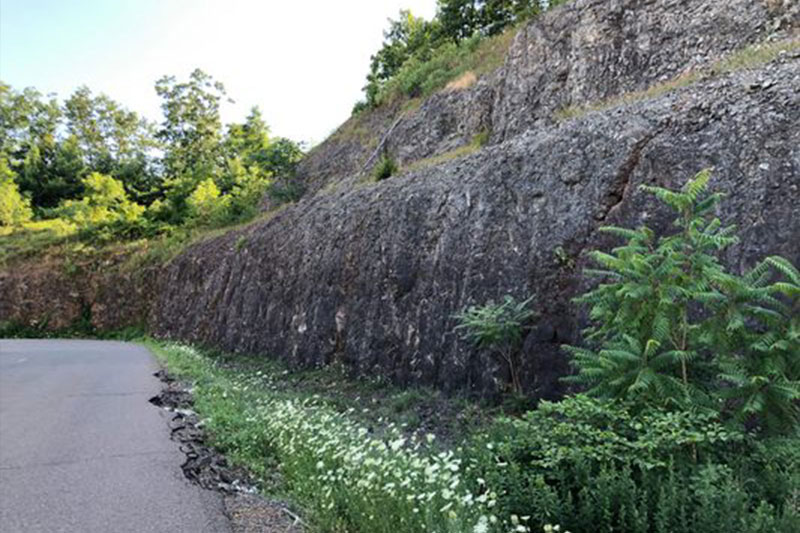
The Geology of CT (All Seven Layers!)
Instructor: HAROLD WRIGHT
Lecture: Thursday, April 30, 1:30–3 p.m., KF Room/Harrison Libraries
Field Trip: Thursday, May 7, 1:30–3:45 p.m.
$75 (includes field trip)
*Enrollment limited to 25 students.
Just how firm is our foundation here in north-central Connecticut? There are seven layers, but it’s no piece of cake. Over millennia, continents right here have clashed, crashed and split, and volcanic eruptions blanketed one third of our state in lava. Connecticut’s rocks contain these stories; you just need the visual language to read them. Session One in the classroom uses rock samples to teach that language: metamorphic, sedimentary and igneous rocks; shale, sandstone, schist and basalt. Then, on the field trip, you’ll see these rocks in situ (in the wilds of Canton!), including those seven-layer outcrops. It may shake your world, and you’ll never view your natural surroundings the same way.
Please note: Participants must be able to get into and out of a van unassisted and walk 50 yards.
Instructor: HOWARD WRIGHT recently retired after 45 years at Renbrook School, where he filled many roles including science department head, dean of students, and master calendar coordinator. He taught middle school Earth Science, focusing on the geologic history of Connecticut (Renbrook is located on Avon Mountain in West Hartford, the result of lava flows 180 million years ago). He twice received the Doug and Jane Cramphin Excellence in Education Award. He served on the Board of the Friends of Dinosaur State Park for 25 years, where he arranged a monthly lecture series with notable geologists, paleontologists, and paleobotanists from Wesleyan, Yale, Columbia, Western New England College, and UCONN. He is Connecticut’s preeminent Abraham Lincoln presenter and has portrayed the 16th president for 20 years.
If the course is full when you try to register, please write us at pcollege@hartford.edu to be put on a wait list in the event that we open a second field trip.

Why Immunology Could Revolutionize How We Fight Disease
Instructor: MIKE MAGEE
Friday, May 15, 2–3:30 p.m., The McAuley (off-campus/West Hartford)
$20
We know a robust immune system is desirable, but beyond that what does the layman know about this complex human system? Immunology is the medical specialty focused on what aids and what hinders immune interactions and responses. Imagine the possibility of adjusting one’s bodily responses to negate autoimmune afflictions or cancers, or to protect against communicable diseases. The promise is vast, vital and exciting! And the research is so crucial that in October 2025, the Nobel Prize in Physiology was bestowed on three scientists for work in immunology, (specifically, peripheral immune tolerance.) Join veteran Medical Historian, Mike Magee, MD, as he unlocks the secrets of immunology and its potential to change the course of human health.
Instructor: MIKE MAGEE, MD, is a medical historian and journalist, and the author of Code Blue: Inside the Medical Industrial Complex (Atlantic Monthly Press, 2019). He has taught at the Presidents’ College and the C. Everett Koop Institute at Dartmouth’s Geisel School of Medicine and Jefferson Medical College. He was also an Honorary Master Scholar at the N.Y.U. School of Medicine and the 2008 Distinguished Alumnus award recipient from the University of North Carolina School of Medicine. He lives in West Hartford, CT, and is the editor of the weekly blog Health Commentary.org.
Gift Certificates
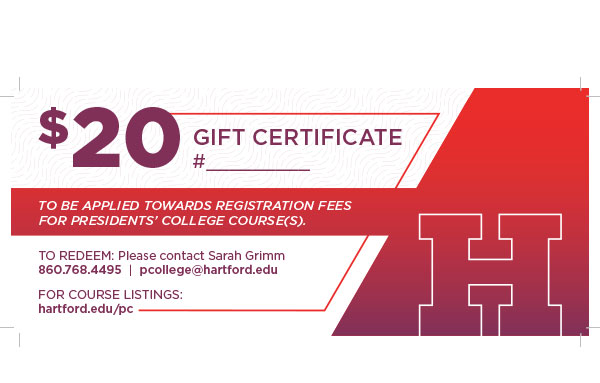
Perfect for birthdays and un-birthdays alike!
Give the gift of knowledge and connect the curious to the Presidents' College all year long.
Contact business manager Sarah Grimm at pcollege@hartford.edu or 860.768.4495 with questions or to purchase a Presidents' College gift certificate.
Course and Lecture Locations
In addition to multiple meeting places on UHart's campus, we hold courses and lectures at the following locations:
Need Help?
Contact pcollege@hartford.edu or 860.768.4495 with any questions or if you are joining a program after the first course date.